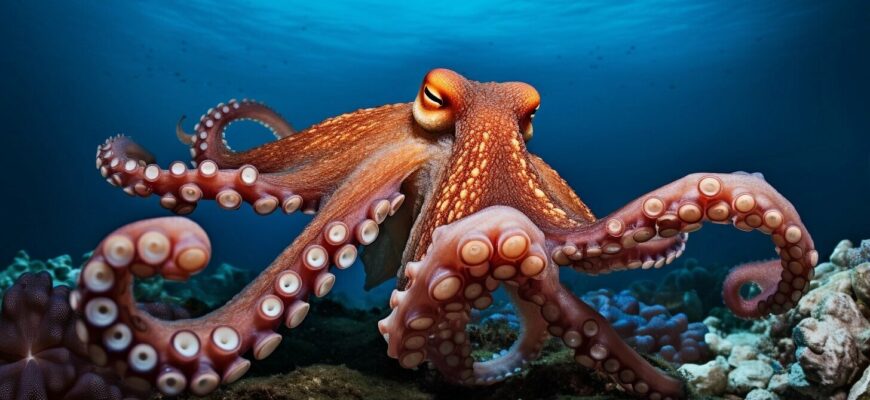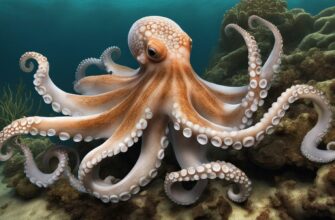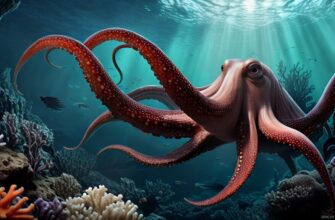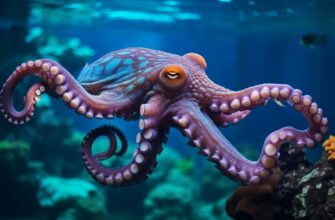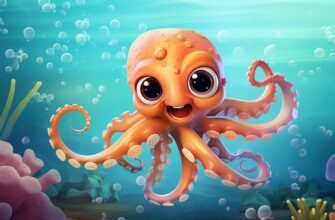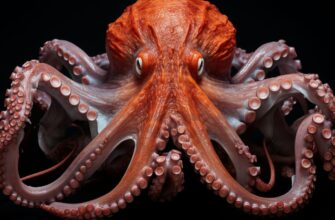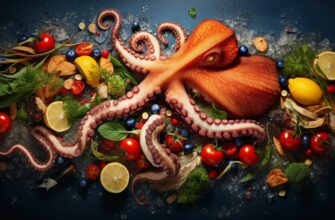Octopuses are fascinating creatures that can be found in oceans around the world. They are known for their intelligence, their ability to change color and texture, and their impressive hunting skills. But do octopuses have teeth? The short answer is yes! While they may not have the traditional teeth that we are used to seeing in mammals, their dental structure is just as important for their survival.
Let’s take a closer look at the anatomy of octopus teeth, the function they serve, the different types of teeth you might find, and even some dental care tips to keep your favorite cephalopods healthy.
- The Anatomy of Octopus Teeth
- The Function of Octopus Teeth
- Types of Octopus Teeth
- Octopus Dental Adaptations
- Self-Sharpening Teeth
- Regenerative Teeth
- Camouflage
- Octopus Teeth in Comparison to Other Animals
- Similarities with Other Animals
- Differences from Other Animals
- Octopus Dental Health and Care
- FAQ about Octopus Teeth
- Do octopuses have teeth?
- What do octopus teeth look like?
- Are octopus teeth used for hunting?
- How do octopuses care for their teeth?
- Can octopuses lose their teeth?
- Myths and Misconceptions
- Do octopuses use their teeth for self-defense?
- Are octopus teeth poisonous?
- Can octopuses bite humans with their teeth?
- Do all octopuses have the same type of teeth?
The Anatomy of Octopus Teeth
Octopuses have a unique dental structure that differs from most other animals. Their mouth contains a hard beak that is used to bite and tear their prey. The beak is composed of chitin, the same material that makes up insects’ exoskeletons. This hard structure allows octopuses to break through the shells of crustaceans and mollusks.
In addition to the beak, octopuses also have a radula, which is a ribbon-like structure covered in rows of small teeth. This structure is located within their mouth, near the beak, and is used to scrape and shred food. The mandibles, located on the sides of the beak, help to hold food in place while the radula does its job.
The combination of these components makes up the unique dental structure of octopuses, which allows them to consume a wide variety of prey.
The Function of Octopus Teeth
Octopuses use their teeth for a variety of purposes. One of their main functions is hunting. Octopuses are carnivorous and use their teeth to catch and eat their prey. They employ a unique hunting technique where they surprise their prey and immobilize it with their arms, before taking it to their beaks to kill and eat it.
Octopus teeth are also important for their defense mechanisms. When threatened, they can use their beak to bite and their teeth to grip onto their attackers, making it difficult for them to escape. Some octopus species even have venomous saliva that can paralyze their predators.
In addition, octopuses use their teeth for their eating habits. They have a beak that is used to break down their food into smaller pieces, which can then be fed into their esophagus. Their radula, which is a tongue-like structure filled with tiny teeth, is used to scrape food off of surfaces.
Overall, the function of octopus teeth is integral to their survival in the wild, allowing them to hunt, defend themselves and consume food effectively.
Types of Octopus Teeth
Octopus teeth come in various shapes and sizes, depending on the species and the intended use. Some are sharp and pointed, while others are curved or even parrot-like. Below are some of the commonly found types of teeth in octopuses:
| Type of Teeth | Description |
|---|---|
| Sharp Teeth | These teeth are thin, pointed and used for grasping and tearing apart prey. |
| Serrated Teeth | These teeth have jagged edges that help in slicing through the flesh of prey. |
| Curved Teeth | These teeth have a slight curve and are used for holding on to prey. |
| Parrot-like Teeth | These teeth have a beak-like shape and are used for crushing hard shells of prey. |
While the types of teeth in octopuses may vary, they all serve a vital purpose in the animal’s survival and hunting abilities.
Octopus Dental Adaptations
Octopuses have evolved several unique dental adaptations throughout their evolutionary history. These adaptations have helped them to survive and thrive in their various habitats. Here are some of the most interesting dental adaptations of octopuses:
Self-Sharpening Teeth
Octopuses have self-sharpening teeth, which means that they can maintain the sharpness of their teeth throughout their lifetime. The teeth of an octopus are made up of a hard, chitinous material that is constantly growing at the base of the oral cavity. As the teeth wear down with use, they are pushed forward by the new growth, ensuring that the tips of the teeth remain sharp and effective for hunting and defense.
Regenerative Teeth
Octopuses also have regenerative teeth, which means that if they lose a tooth, a new one will grow in its place. This is an important adaptation for octopuses because their teeth are essential for hunting and defense. If they were unable to replace lost teeth, they would be at a disadvantage in their environment.
Camouflage
Another interesting adaptation of octopus teeth is their contribution to the animal’s overall camouflage abilities. Octopus teeth are often camouflaged to match the animal’s surroundings, making them difficult to spot by predators and prey alike. This is achieved through various specialized dental structures, including smooth, curved teeth that can resemble rocks or coral.
Overall, the dental adaptations of octopuses are truly fascinating and have helped them become one of the most successful and adaptable creatures in the world’s oceans.
Octopus Teeth in Comparison to Other Animals
Octopuses have a unique dental structure that sets them apart from most other animals. While they lack jaws and traditional teeth, they have a radula—a ribbon-like structure lined with tiny, sharp teeth—that helps them scrape food from surfaces and break it down before swallowing.
Interestingly, the radula is not unique to octopuses and is also found in other mollusks like snails and slugs. However, the radula of octopuses is much more complex and specialized, with some species having up to 25,000 teeth.
Similarities with Other Animals
Despite their unique dental structure, octopuses share some similarities with other animals. For instance, some species have beaks similar to those of birds or turtles that help them puncture and tear the flesh of their prey.
Additionally, some deep-sea octopuses have lost their radulas entirely and instead have developed sharp, curved mandibles that resemble the mandibles of insects and spiders. This adaptation allows them to catch and crush prey in the depths of the ocean where food is scarce.
Differences from Other Animals
The dental structure of octopuses differs greatly from that of most other animals. For instance, while many mammals have teeth that are used for tearing and grinding food, octopuses rely on their radula to accomplish this task. Additionally, while some reptiles and fish have teeth that continually grow throughout their lives, octopuses have teeth that are replaced constantly and continually regrow throughout their lifetimes.
Overall, the dental structure of octopuses is unique and highly specialized, allowing them to adapt to their environment and survive in a variety of ecological niches.
Octopus Dental Health and Care
Octopuses, like any other living creature, require proper dental hygiene and care. However, taking care of their teeth is not as straightforward as one might think. Unlike humans, octopuses do not have a toothbrush and toothpaste to provide their teeth with external cleaning, and they do not visit a dentist regularly.
Octopuses have a unique dental structure that is self-maintaining. Their teeth are located on their radula, which is a tongue-like organ with rows of teeth that they use for grinding and tearing food. The radula functions by constantly scraping teeth across their hard beaks, which functions to sharpen them. Additionally, if an octopus tooth is damaged or worn, they can regenerate new ones.
It is necessary to note that octopuses can experience tooth loss, which can have a significant impact on their diet and hunting. To avoid tooth damage and loss, octopuses may try to avoid hard or brittle foods that could potentially damage their teeth. If an octopus loses a tooth, they can still function normally in many cases, but a loss of a significant number of teeth may result in difficulty feeding and a change in their diet.
Given their unique dental structure and maintenance, octopuses do not require any external dental care. However, they do require a clean living environment with adequate food, shelter, and water quality to maintain their overall health. A healthy octopus will have healthy teeth and be able to maintain their unique and fascinating dental structure.
FAQ about Octopus Teeth
Do octopuses have teeth?
Yes, octopuses have teeth located in their beaks, which are located in the center of their arms and used for breaking apart and eating their prey.
What do octopus teeth look like?
Octopus teeth come in a variety of shapes and sizes, depending on the species. Some are sharp and pointed, others are curved or serrated, and some are even parrot-like. They are also often translucent or white in color.
Are octopus teeth used for hunting?
Yes, octopuses primarily use their teeth for hunting and breaking down their prey into smaller pieces that are easier to eat.
How do octopuses care for their teeth?
Octopuses do not have a traditional dental hygiene routine, but they do have self-sharpening teeth that allow them to maintain their dental structure. Additionally, their teeth are able to regenerate if they are damaged or lost.
Can octopuses lose their teeth?
Yes, octopuses can lose their teeth just like any other animal. However, because their teeth are able to regenerate, they are able to replace them relatively quickly.
Myths and Misconceptions
Do octopuses use their teeth for self-defense?
While octopuses are capable of using their beaks to defend themselves, they primarily rely on camouflage and other defense mechanisms to protect themselves.
Are octopus teeth poisonous?
Contrary to popular belief, octopus teeth are not poisonous and do not contain any venom.
Can octopuses bite humans with their teeth?
While octopuses are capable of biting humans with their beaks, they rarely do so unless they feel threatened or are being attacked.
Do all octopuses have the same type of teeth?
No, the type of teeth found in octopuses varies depending on the species and their individual dietary needs.

